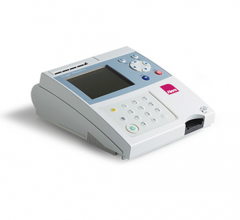June 20, 2008 - HemoCue AB reported that the FDA granted the HemoCue Albumin 201 System, a quantitative point-of-care test for screening, diagnosing and monitoring microalbuminuria, a CLIA waiver, enabling the use of the test kit in any healthcare facility with a CLIA Certificate of Waiver in the U.S.
Microalbuminuria may indicate the presence of chronic kidney disease (CKD), and the risk of developing cardiovascular disease in patients with or without diabetes or hypertension.
“Given that microalbuminuria is a risk marker for cardiovascular disease, and its increase over time can indicate kidney disease, it is important that physicians have a fast, easy, reliable test to assess changes in their patients,” said professor George L. Bakris, M.D., Director of the Hypertensive Diseases Unit at the University of Chicago-Pritzker School of Medicine. “The availability of a point-of-care test that accurately measures albumin in urine is expected to have a positive impact on physicians' ability to screen in-office and then begin treatment for patients at risk for microalbuminuria, such as those with diabetes or hypertension.”
Microalbuminuria is a condition characterized by the presence of albumin, a protein, excreted in urine. As the albumin excretion increases, so does the risk of CKD or cardiovascular disease onset and progression. The HemoCue Albumin 201 System, which produces results within 90 seconds, enables physicians to identify and quantify low levels of albumin at the point of care for the purpose of screening for, diagnosing, monitoring and to supplement clinical evidence in the treatment of microalbuminuria. Unlike semiquantitative urine "dipstick" methods, which indicate if a patient's microalbumin levels fall within pre-defined ranges, the HemoCue Albumin 201 System provides the actual concentration present in the sample. Using the HemoCue Albumin 201 System, physicians may monitor changes in microalbumin excretion in a patient over time.
A study in the American Journal of Nephrology (2008;28:324-329) published online in November 2007 concluded that the "HemoCue Albumin 201 System is a valid and precise method for UAE (urinary albumin excretion) determination, exhibiting a performance similar to laboratory ACR (albumin-to-creatinine) estimations and far better than the widely used dipsticks ... the HemoCue Albumin 201 System appears to be a convenient solution for detection of abnormal UAE levels." The study involved 165 adult subjects under treatment for hypertension at the Rush University Medical Center in Chicago. Dr. Bakris was the study’s lead investigator. HemoCue AB financially supported the study.
For more information: www.hemocue.com


 August 05, 2019
August 05, 2019 








